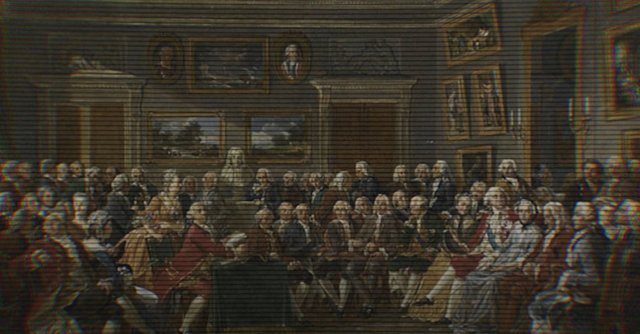The Social Contract
Freedom only has meaning in a society. By yourself, living in nature, these words have no meaning at all; sure, you're free to do whatever you feel like, there's no one to stop you. On the other hand you lack the means to do almost anything at all, other than trying to survive...

source: YouTube
What's described in the introduction, is the difference between negative freedom and positive freedom. In modern discourse, among libertarians, anarcho-capitalists and the political right-wing in general, there's an almost exclusive focus on negative freedom; they speak only in terms of having freedom from government and regulation, with no regard for the freedom to do things. That's because the freedom to actually do things is dependent on having the means to do things. Having the means, the money, the wealth to exercise positive freedoms is a privilege reserved for only a limited number of people, and the political right very much want to keep it that way.
"We hold these truths to be self-evident, that all men are created equal, that they are endowed by their Creator with certain unalienable Rights, that among these are Life, Liberty and the pursuit of Happiness." This well-known phrase in the United States Declaration of Independence actually has no meaning at all. It sounds nice, for sure. But the described "unalienable" rights are "unattainable" for those who lack the means to actualize them. Just like the hermit who lives in complete and utter freedom all by himself. And that's, in a nutshell, the problem with the right-wing perspective on freedom; they regard it as an individual right, subject to the "natural" hierarchy set forth by the primitive rules described with phrases such as "survival of the fittest" or "might makes right."
It's a weird contradiction; libertarians and anarcho-capitalists claim a love for freedom that can never become real. True freedom can only exist in a society of equals, yet they're allergic to equality. Sure, they'll go on about equality of opportunity, but they're aware that not everyone is equally equipped to grab those opportunities. The result is a society with a strict hierarchy, and hierarchy is antithetical to the freedom of everyone outside its upper echelons. We need, for a maximum amount of freedom for as much individuals as possible, a more communitarian perspective in freedom; as stated in the introduction, freedom has no meaning outside of the community of people we call society.
This is described by Jean-Jacques Rousseau in his 1762 book "The Social Contract," in which he discusses the principles of political right; he concludes that only the people, who are sovereign, have the right to rule by imposing limitations on what any individual is allowed or disallowed to do. His ideas were, and still are for a large part the inspiration for revolutionary thinkers and theory, and although his theories were based in idealism, he influenced much of the materialist theories of Marx and Engels. I've said it a thousand times before; true freedom can exist only in a society in which each strives for the common good. This creates the equality needed for true freedom to flourish:
As every individual gives himself absolutely, the conditions are the same for all, and precisely because they are the same for all, it is in no-one's interest to make the conditions onerous for others.
In a society ruled by the people for the good of the people with rules applying equally to all people, no-one has an interest to needlessly limit the freedom of others because these limitations will apply to themselves as well. The question then becomes, according to Rousseau, this:
...how to find a form of association which will defend the person and goods of each member with the collective force of all, and under which each individual, while uniting himself with others, obeys no-one but himself, and remains as free as before.
In summary, to gain maximum freedom in a society, some freedoms must be given up under the rule of that society. And if we, lovers of freedom, reject the notion of rule by divine right, parental-like authority or might, rule by the "general will" of the people is the only alternative open to us. Absolute, inalienable individual freedoms, as well as "natural hierarchy" are things of the past, have been since the Enlightenment. In theory at least. Marx's materialism tries to describe the real-world practical version of this pure idealism, and the two can not be fully understood on their own; they're two sides of the same equality-coin. I've found a video that explains very well their differences and how they relate to each other; it's linked below and I highly recommend watching it if you're at all interested in understanding the so often used words "freedom," "liberty," "democracy" and "justice."
Marx and Rousseau: The Social Contract and Beginning of Revolutionary Theory
Thanks so much for visiting my blog and reading my posts dear reader, I appreciate that a lot :-) If you like my content, please consider leaving a comment, upvote or resteem. I'll be back here tomorrow and sincerely hope you'll join me. Until then, stay safe, stay healthy!

Recent articles you might be interested in:
| Latest article >>>>>>>>>>> | Why America Sucks |
|---|---|
| Science Of Civil Discourse | Want To "Own" A Bored Ape? |
| There Is No Cloud | P2E Dystopia |
| Blake's 7 | Controlled Hallucination |

Thanks for stopping by and reading. If you really liked this content, if you disagree (or if you do agree), please leave a comment. Of course, upvotes, follows, resteems are all greatly appreciated, but nothing brings me and you more growth than sharing our ideas.
Your post was upvoted and resteemed on @crypto.defrag